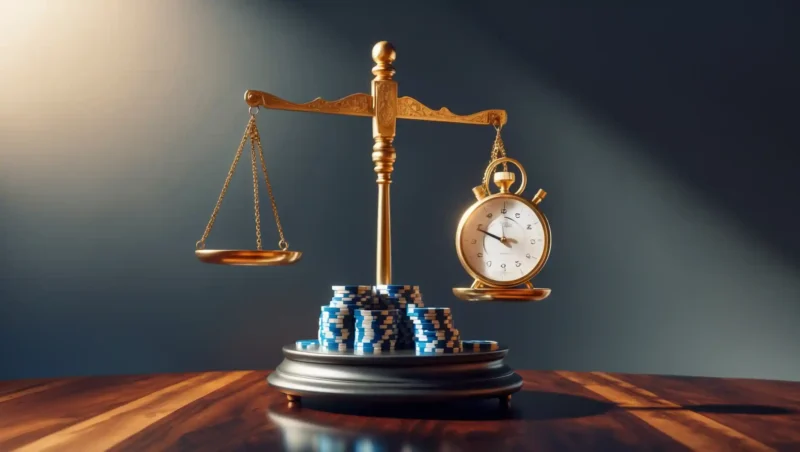Remember the gut-wrenching moment when you held pocket kings, and your opponent shoved all-in with ace-four suited? You called, the flop looked safe, and then—boom—an ace on the river. The pot slid their way, and you sat there wondering: Where’s the justice in poker?
If you’ve played this game long enough, you’ve probably asked yourself that question more than once. Maybe it was when you were deep in a tournament and lost a crucial 60/40 flip, or when you checked your cash game stats and saw you’d run 100,000 hands below EV. Variance is part of poker, but when the hits keep coming, it can feel personal.
And just when you think you’ve come to terms with poker’s natural unfairness, you hear about players cheating—colluding in games, using bots, or relying on real-time assistance (RTA) software to gain an edge. Poker can already feel cruel when you’re playing fair, but knowing others are breaking the rules makes it downright infuriating.
So how do we, as players, reconcile this? How do we balance fairness, ethics, and skill in a game that sometimes feels designed to test our limits? Let’s explore the injustices that poker throws our way, from bad beats to outright cheating, and discover how to cultivate resilience, sharpen our ethics, and embrace the challenge.
The Built-In Unfairness of Poker
Poker isn’t just a game of skill—it’s a game of probabilities. And probabilities can be brutal. You could make the perfect decision and still lose because the cards didn’t fall your way. That’s variance, and it’s the great equalizer. It ensures that even the best players experience bad beats, downswings, and sessions where nothing goes right.
But variance isn’t the real villain—it’s the price we pay for the long-term rewards. Over time, skill prevails. The question is: can you survive the short-term chaos long enough to reap the benefits?
Cheating: The Dark Side of Poker
If variance is the necessary evil of poker, cheating is the unnecessary one. From collusion in live games to bots in online play, cheating undermines the fairness that keeps the game alive. Let’s look at some common examples:
- Collusion in Live Games
Imagine sitting at a cash game, and two players are subtly working together. One folds a strong hand to boost the other’s stack, or they signal to each other about what cards they’re holding. It’s not just unfair—it’s theft. - Bots in Online Poker
Online platforms are constantly battling bots—programs designed to play poker with superhuman precision. While sites like PokerStars and GG Poker invest heavily in detection systems, bots still creep into games, stealing from honest players. - Real-Time Assistance (RTA)
RTA tools take cheating to another level. These programs provide players with optimal decisions during hands, effectively turning them into unbeatable machines.
Cheating doesn’t just affect individual games; it erodes trust in the poker community. Players want to believe the game is fair, and when that trust is broken, everyone suffers.
Justice vs. Ethics in Poker
Sometimes, what’s “just” and what’s “ethical” aren’t the same thing. For example:
- Angle Shooting
Is it ethical to exploit a loophole in the rules, like pretending you misread your hand to get a reaction? It’s technically allowed, but is it just? - Soft Play
Let’s say you’re heads-up against a friend in a tournament. You intentionally avoid playing hard against them. It might feel ethical, but it’s unjust to the other players who didn’t get the same treatment.
These dilemmas highlight the gray areas in poker where fairness and personal values collide.
How Stoicism Helps Navigate Poker’s Challenges
Poker players often feel at the mercy of variance, but Stoicism teaches us to focus on what we can control. As Marcus Aurelius wrote:
“When you wake up in the morning, tell yourself: The people I deal with today will be meddling, ungrateful, arrogant, dishonest, jealous, and surly. They are like this because they can’t tell good from evil.”
For poker players, this translates to accepting that people will cheat, collude, or angle-shoot—and that the cards won’t always go your way. What matters is how you respond.
A Stoic poker player would:
- Control Their Emotions
Bad beats and unfair situations are inevitable. Instead of tilting, focus on making the best decisions you can in the moment. - Focus on Ethics
Play with integrity, even if others don’t. Upholding your own standards is its own reward. - Seek Solutions
Advocate for better rules and anti-cheating measures without letting frustration consume you.
Can Technology Bring Justice to Poker?
Emerging technologies like artificial intelligence (AI) and blockchain are shaping poker’s future. Here’s how they could help ensure fairness:
- AI for Cheating Detection
AI can analyze gameplay patterns to identify bots, collusion, or RTA usage. Platforms like GG Poker already use sophisticated algorithms to detect unethical behavior, and as AI evolves, these systems will only get better. - Blockchain for Transparency
Blockchain technology could revolutionize poker by creating immutable records of gameplay. Every hand, bet, and decision could be stored transparently, making it nearly impossible to cheat without detection.
For example, blockchain-based poker platforms like coinpoker already use decentralized ledgers to ensure fairness. While the technology is still in its infancy, it offers a promising glimpse into a more just poker ecosystem.
Building an Unshakable Mindset
Justice in poker isn’t just about rules and technology—it’s about mental resilience. Here’s how to cultivate an unshakable mindset:
- Embrace Variance
Accept that bad beats are part of the game. Instead of dwelling on losses, focus on improving your decision-making process. - Separate Luck from Skill
Don’t judge your performance based on short-term results. Evaluate your play objectively to identify areas for improvement. - Find Support
Connect with other players who understand the ups and downs of poker. A strong community can help you stay grounded. - Practice Gratitude
Poker offers freedom and excitement that few professions can match. Even on tough days, remind yourself why you love the game.
Justice in Poker: A Shared Responsibility
Justice in poker isn’t just the responsibility of platforms or governing bodies—it’s up to all of us. Players must:
- Report unethical behavior.
- Support platforms that prioritize fairness.
- Uphold their own integrity at the table.
At the same time, poker organizations must continue investing in technology and education to ensure the game remains fair and accessible.
Justice in Poker
Justice in poker may not always be visible, but it’s worth striving for. By embracing Stoic principles, leveraging new technologies, and committing to fairness, we can navigate the challenges of the game with resilience and integrity.
Whether you’re battling variance, dealing with cheaters, or simply trying to outplay your opponents, remember: poker is a marathon, not a sprint. The journey may not always feel fair, but staying true to yourself will always be the biggest win.
So, what does justice in poker mean to you? Share your thoughts and stories in the comments below—because this game we love is only as strong as the community that supports it.









